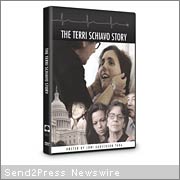NASHVILLE, Tenn. — The National Right to Life Committee (NRLC) will have a special screening of the new documentary, “The Terri Schiavo Story” (Franklin Springs Family Media), at their national convention in June. Additionally, National Right to Life will be endorsing the film in their April edition of the National Right to Life News which is sent out to nearly 400,000 subscribers.
 NRLC State Organization and Development Director Jacki Ragan stated, “This story is one that pro-lifers ought to review once a year.” The NRLC review of the documentary goes on to say, “The DVD does an excellent job summarizing Terri’s life and the titanic legal struggle that eventually broke out between the Schindlers and Terri’s husband…even for the viewer who only casually watches The Terri Schiavo Story, it is clear just how unjust was the death sentence meted out to Terri.”
NRLC State Organization and Development Director Jacki Ragan stated, “This story is one that pro-lifers ought to review once a year.” The NRLC review of the documentary goes on to say, “The DVD does an excellent job summarizing Terri’s life and the titanic legal struggle that eventually broke out between the Schindlers and Terri’s husband…even for the viewer who only casually watches The Terri Schiavo Story, it is clear just how unjust was the death sentence meted out to Terri.”
As the fourth anniversary of her death approaches, the ethical and cultural implications of Terri’s case are still being felt throughout society and continue to spark debate. Just last year during the Democratic debates, President Obama said one of his “regrets” as a Senator was voting for Congress to intervene to save Terri’s life. Hosted by author and speaker Joni Eareckson Tada, who became personally involved in the case in 2005, The Terri Schiavo Story sheds new light on the controversial decision that led to the death of a 41-year-old disabled woman.
In 1990, at the age of 26, Terri Schindler Schiavo suffered a mysterious cardio-respiratory arrest for which no cause has ever been determined. She was diagnosed with a neurological injury caused by lack of oxygen to the brain. Terri was placed on a ventilator, but was soon able to breathe on her own and maintain vital function. She remained in a severely compromised neurological state and was provided a PEG tube to ensure the safe delivery of nourishment and hydration. On March 31, 2005, Terri Schindler Schiavo died of marked dehydration following more than 13 days without nutrition or hydration under the order of the Pinellas-Pasco’s Sixth Judicial Court.
So what did the mainstream media overlook? Several things, according to the film’s producer and director Ken Carpenter of Franklin Springs Family Media. “I think most people thought Terri was in a vegetative state with no prospects of improving,” says Carpenter. “The truth is the doctors believed Terri was a candidate for rehabilitation, but her treatment was withheld. Additionally, we uncovered that only one judge ruled on the facts of the case. All the other judges looked at procedure issues and not the original facts.”
Joni Eareckson Tada, herself disabled after a diving accident which left her a quadriplegic in a wheelchair, says what happened to Terri continues to affect disabled citizens. “There are countless people like Terri whose lives are in grave danger because of unclear custody and guardianship laws,” says Tada. “Plus, more states under futile care policy directives are quietly removing the feeding tubes from brain-injured people when families abandon their responsibilities. Feeding tubes are providing basic care, not medical treatment.”
Terri’s brother, Bobby Schindler, was interviewed at length in the documentary and is now involved in helping families in similar circumstances through The Terri Schindler Schiavo Foundation. Schindler believes the truth about his sister’s death has been distorted and hidden – until now.
“Our hope is that people will learn the truth about what happened to Terri,” says Schindler, “and realize the atrocity that it was and that anyone who claims that her death was ‘peaceful’ and ‘painless’ is lying. I believe that if the public had been allowed to witness Terri’s suffering first hand, the outcry would have deafened Florida and the world.”
The Terri Schiavo Story was recently honored with the Jubilee Award for Best Documentary at the San Antonio Independent Film Festival.
National Right to Life exists to protect innocent human life, including the unborn and the medically- vulnerable from threats such as abortion, assisted suicide and euthanasia. NRL was formed in 1973 as an umbrella organization – a non-profit, non-sectarian organization that could coordinate right to life activities in Washington, D.C., and in the states. NRL’s strength lies in its direct connection with the state and local grassroots pro-life movement through its board of directors and various programs. Visit http://www.NRLC.org for further information.
For more information and to view a trailer for the new documentary, visit: http://www.TheSchiavoStory.com. For more information on Franklin Springs Media, visit: http://www.FranklinSprings.com.






